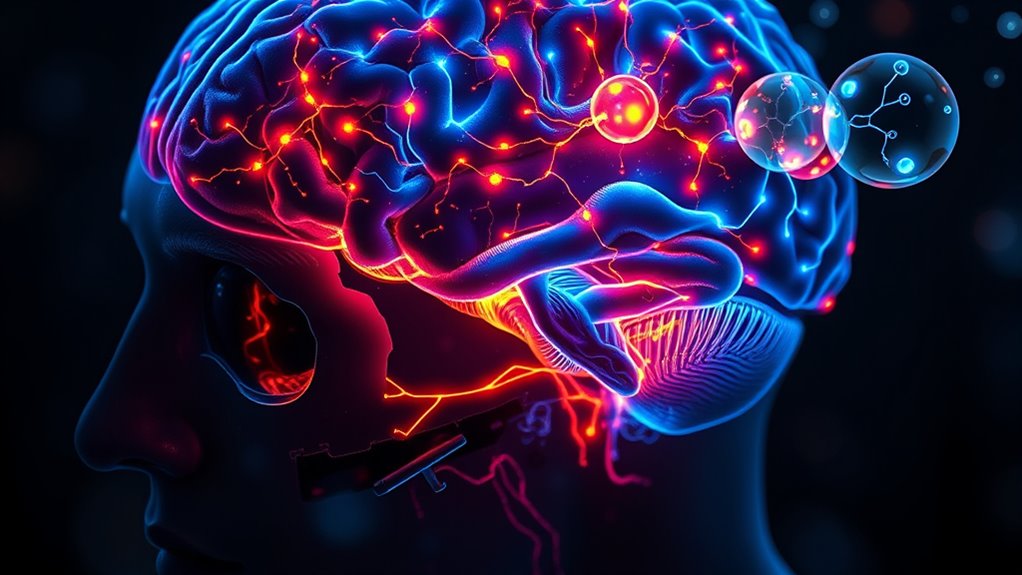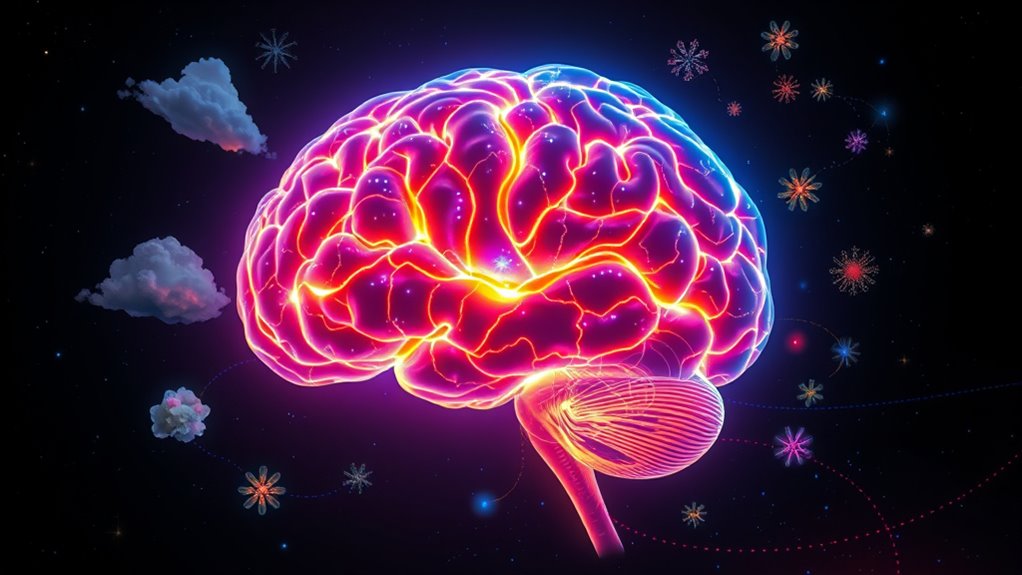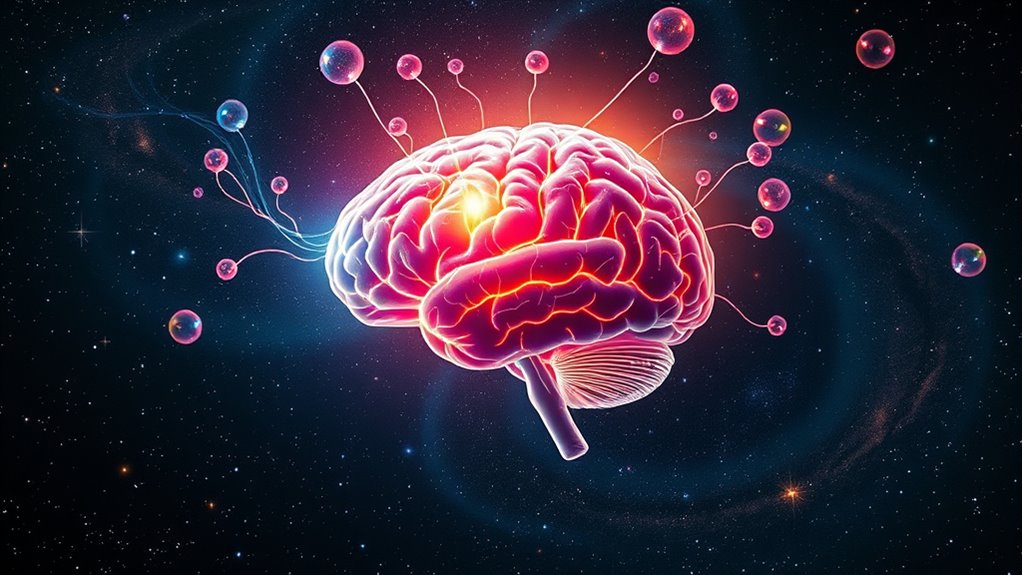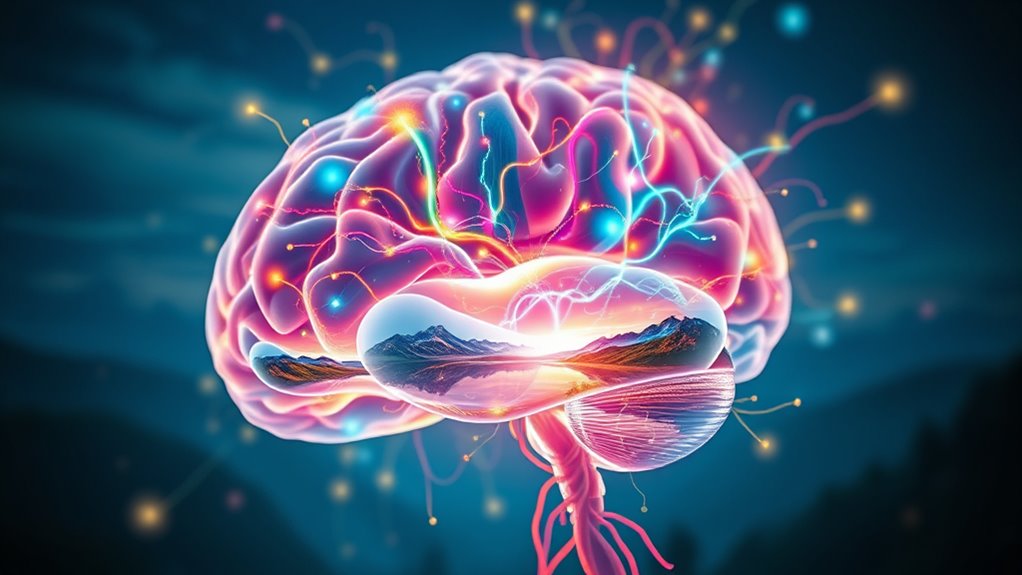Your thoughts actively shape your reality by influencing your brain’s perception, beliefs, and decisions. Scientific studies show that focusing on positive intentions and visualizations can rewire neural pathways through neuroplasticity, making goal achievement easier. Beliefs act as filters shaping how you interpret the world, while mental focus directs energy toward your desired outcomes. Positive thinking also boosts your physical health and resilience. Keep exploring how your mind’s power can transform your life in fascinating ways.
Key Takeaways
- The brain filters and interprets information, shaping perception and influencing how thoughts impact reality through mental focus.
- Positive thoughts release neurochemicals like serotonin, promoting well-being and reducing stress, which can manifest physically.
- Beliefs act as mental filters, guiding perception and decision-making, often reinforcing specific thought patterns and experiences.
- Focused attention and clear intentions activate neural pathways, rewiring the brain to support desired outcomes via neuroplasticity.
- Scientific fields like psychoneuroimmunology and the placebo effect demonstrate how mindset and thoughts can produce tangible health and life changes.
The Concept of Manifestation and Its Origins

Have you ever wondered where the idea of manifestation comes from? It traces back centuries, rooted in ancient philosophies and spiritual traditions. Many cultures believed that thoughts and intentions could influence the world around you, shaping your experiences and outcomes. The concept gained prominence in the New Thought movement of the 19th century, which emphasized the power of the mind to create reality. Thinkers like Ralph Waldo Emerson and Phineas Quimby promoted the idea that your beliefs and focus could manifest desired circumstances. Over time, manifestation evolved from mystical ideas to a more modern perspective, blending spirituality with psychology. Today, it’s often seen as a way to harness your mental energy to attract what you want into your life. Developing Cultural Intelligence can also help you understand diverse beliefs about manifestation and improve your ability to engage with different spiritual practices. Recognizing the psychological mechanisms behind manifestation can deepen your understanding of how beliefs influence perceptions and outcomes. For example, understanding confirmation bias can explain how focusing on certain thoughts can reinforce a particular outcome. Additionally, studies in cognitive psychology reveal how mental focus and expectations can actively shape experiences and attract specific results. Furthermore, utilizing AI content clustering strategies can help create more targeted and relevant content that aligns with your manifestation goals.
The Role of the Brain in Shaping Reality

Your brain plays a crucial role in shaping your perception of reality by filtering and interpreting the information it receives. It decides what to focus on, influencing how you see the world around you. This process can evoke strong emotions and perceptions based on your thoughts and beliefs. Additionally, the brain’s Cookie Categories influence the consistency of your perceptions over time, reinforcing certain thought patterns and beliefs. Practicing mindful decluttering strategies can help clarify your mental space and reinforce positive thought patterns. Techniques such as focused attention can further enhance your awareness of mental filters and improve your overall perception.
How Beliefs Influence Perception and Decision-Making

Your beliefs directly shape how you perceive the world around you, filtering information in ways that confirm what you already think. These perceptions, in turn, influence your decisions, often aligning with your mindset rather than objective facts. Recognizing biases helps you make more conscious choices and shifts your reality in a positive direction. For example, understanding confirmation bias allows you to critically evaluate information and avoid reinforcing false beliefs. Additionally, engaging in self-awareness practices such as personality tests can deepen your understanding of your inherent tendencies and how they influence your worldview. Being mindful of cognitive biases can further enhance your ability to interpret information more objectively and make better-informed decisions. Exploring dog names and their cultural meanings can also be a reflection of your personal preferences and perceptions, subtly shaping your choices and outlook.
Beliefs Shape Perception
Beliefs act as mental filters that shape how you interpret the world around you. They influence what you notice, how you feel, and what you consider possible. When you believe you’re capable, you see opportunities instead of obstacles. If you believe you’re unworthy, you focus on failures rather than successes. Your beliefs can heighten your emotional responses, making positive or negative experiences feel more intense. Additionally, your perception of your environment can be affected by electric bike horsepower, which impacts your confidence and motivation in different situations.
Consider these ways beliefs influence perception:
- They determine what evidence you pay attention to, shaping your reality.
- They color your emotional reactions, intensifying feelings.
- They create a lens through which you interpret your experiences, guiding your actions and decisions.
Decisions Driven by Mindset
The way you interpret your experiences directly influences the choices you make every day. Your mindset, shaped by your beliefs, acts as a lens through which you view opportunities and challenges. If you believe you’re capable, you’re more likely to take risks and pursue goals confidently. Conversely, if you think you’re destined to fail, you might avoid taking action altogether. Your beliefs create a filter that highlights certain options while dismissing others, guiding your decision-making process. This means that your mindset can either empower or limit your progress. When you cultivate a positive, growth-oriented outlook, you’re more inclined to make decisions aligned with success. Additionally, engaging with practices like herbal teas can promote mental clarity and relaxation, further supporting a constructive mindset. Supporting cognitive health through brain-boosting foods can also enhance your mental clarity, enabling better decision-making. Incorporating home decor elements that create a calming environment can influence your mood and outlook, thereby shaping your perceptions and choices. Furthermore, understanding the Law of Attraction principles can help you focus your thoughts more intentionally, affecting your reality. Studies on positive psychology demonstrate how cultivating optimism can significantly impact decision-making and overall well-being. Ultimately, your beliefs don’t just shape your perception—they actively drive the choices that determine your reality.
Biases Influence Choices
Our subconscious biases, rooted in deeply held beliefs, shape how you interpret information and influence the choices you make daily. These hidden filters can cause you to overlook opportunities or focus on negatives, steering your decisions without your awareness. Recognizing these biases helps you regain control over your perception and actions. For example, understanding AI Ethicist Jobs can inspire you to consider ethical implications in decision-making processes. You might be surprised by how much your beliefs steer your reality. Consider:
- Confirmation Bias: You seek information that validates your existing beliefs, reinforcing your worldview.
- Anchoring Effect: First impressions anchor your judgment, affecting subsequent decisions.
- Negativity Bias: You tend to focus more on negative experiences, shaping your outlook and choices.
Understanding these biases empowers you to challenge assumptions and consciously shape a more positive, intentional reality.
The Power of Focus and Attention in Achieving Goals

Your focus shapes your reality, so directing your attention intentionally can move you closer to your goals. When you stay mindful and present, your actions become more aligned with your desires. Ultimately, sustained focus fuels achievement and turns intentions into tangible results.
Intent Shapes Reality
When you focus your attention on a specific goal, you direct your energy and thoughts toward making it a reality. Your intent acts as a magnet, pulling opportunities and resources into your life. The clearer your intent, the stronger your focus becomes, amplifying your ability to attract what you desire. When you set a strong intention, you:
- Ignite your passion, fueling your motivation to take action
- Sharpen your awareness, noticing chances others overlook
- Build momentum, turning small steps into powerful progress
Your thoughts and feelings become the blueprint for your future. By aligning your intent with your actions, you create a pathway that guides your reality toward your dreams. Intent truly shapes what you experience every day.
Mindful Attention Matters
Focusing your attention intentionally is essential for turning goals into reality. When you concentrate on your desired outcome, you send clear signals to your subconscious mind, reinforcing your intentions. Mindful attention helps filter out distractions, allowing you to stay aligned with your purpose. By consistently directing your focus, you create a mental environment primed for success. This focused awareness enhances your ability to recognize opportunities and take deliberate actions that support your goals. Without mindful attention, your efforts can become scattered, reducing your progress. Cultivating this level of focus strengthens your belief in your capacity to manifest your desires. Ultimately, what you choose to focus on shapes your experience, making mindful attention a powerful tool in transforming thoughts into tangible results.
Focus Fuels Achievement
Harnessing focused attention is essential because it directs your mental energy toward specific goals, making your efforts more effective. When you concentrate, you reduce distractions and increase your chances of success. Your mind becomes a powerful tool that amplifies your intentions, turning vague desires into concrete achievements.
Remember, focus transforms dreams into reality. It fuels perseverance and keeps you motivated, even during setbacks. Staying attentive to your goals creates momentum that propels you forward.
Here’s what focusing can do for you:
- Ignite your passion, turning small efforts into significant results.
- Strengthen your belief in your ability to succeed.
- Turn obstacles into stepping stones, fueling your resilience and determination.
Neuroplasticity: Rewiring the Brain Through Thought

Neuroplasticity refers to the brain’s remarkable ability to reorganize itself by forming new neural connections throughout your life. This means your thoughts, habits, and focus can physically change your brain’s structure. When you consistently think positive or visualize your goals, you reinforce certain pathways, making those thoughts easier to access. Over time, this rewiring can shift your mindset and influence your reality. Consider the following ways neuroplasticity works:
| Thought Pattern | Neural Pathways | Result |
|---|---|---|
| Repeating goals | Strengthens connections | Enhances motivation |
| Focused attention | Builds new pathways | Facilitates change |
| Positive visualization | Reinforces optimism | Boosts confidence |
The Science of Positive Thinking and Its Effects

When you cultivate positive thinking, you’re actively shaping your mental landscape in ways that can influence both your mindset and your physical brain. Positive thoughts can boost your mood, increase resilience, and foster motivation. Scientific studies show that optimism enhances neural pathways associated with happiness and reduces stress-related chemicals like cortisol. This shift in mindset can lead to tangible benefits:
Cultivating positive thinking boosts your mood, resilience, and overall well-being by rewiring your brain for happiness.
- Feel more energized and hopeful about your future.
- Strengthen your ability to handle setbacks with confidence.
- Improve your overall mental and physical health.
Mind-Body Connection and Psychosomatic Responses

The mind and body are deeply interconnected, with your thoughts and emotions capable of influencing physical health through psychosomatic responses. When you focus on positive thoughts, your brain releases feel-good chemicals like serotonin and endorphins, which can reduce stress and improve immune function. Conversely, negative emotions such as anxiety or anger can trigger stress hormones like cortisol, leading to symptoms like headaches, muscle tension, or digestive issues. Your body responds to mental states as if they’re real threats or rewards, creating physical sensations that reinforce your feelings. This connection means that what you think and feel doesn’t stay in your mind—it manifests physically, shaping your overall health and well-being. Recognizing this link empowers you to harness your thoughts for better health outcomes.
Empirical Evidence Supporting the Impact of Thought

Numerous studies have provided compelling evidence that your thoughts can directly influence physical outcomes. For example, research shows that positive thinking improves health and resilience, reducing stress and boosting immune response.
Consider these powerful findings:
- The placebo effect demonstrates how belief alone can trigger real physiological changes, sometimes as effective as actual medication.
- Visualization techniques have been shown to enhance athletic performance, with athletes achieving better results simply by mental rehearsal.
- Psychoneuroimmunology studies reveal that thoughts and emotions can alter immune function, affecting how your body fights illness.
These findings highlight that your mindset isn’t just mental—it can shape your body’s health and reality in tangible ways.
Practical Ways to Harness Your Mind for Better Outcomes

Harnessing the power of your mind begins with simple, intentional practices that can be integrated into daily life. Start by setting clear, positive intentions each morning, focusing on what you want to attract. Practice visualization regularly—imagine yourself achieving your goals vividly and with emotion. Affirmations also reinforce your mindset; repeat empowering statements to shift negative thoughts. Mindfulness exercises help you become aware of limiting beliefs and redirect your focus. Journaling your goals and progress keeps you accountable and reinforces your commitment. Surround yourself with positive influences and avoid negativity that can diminish your mental energy. Consistency is key—by consistently applying these practices, you train your mind to support your desired outcomes, making manifestation more attainable and aligned with your intentions.
Frequently Asked Questions
Can Manifestation Truly Influence External Events or Just Internal Perceptions?
You might wonder if manifestation genuinely influences external events or only shifts your perceptions. While your thoughts can attract opportunities and guide your actions, external changes depend on various factors beyond your control. Your mindset can alter how you interpret experiences, making situations seem different. So, manifestation often impacts your internal perception profoundly, but it can also create real external changes when combined with intentional actions.
How Quickly Can Changes in Thought Patterns Affect Real-World Outcomes?
Did you know that changing your thought patterns can influence your outcomes in as little as 21 days? When you actively shift your mindset, you may notice real-world changes within a few weeks. Your thoughts trigger emotional and behavioral responses, which can attract new opportunities and alter your experience. By consistently focusing on positive beliefs, you accelerate this process, making your desired outcomes more likely to manifest quickly.
Are There Scientific Limits to the Power of Positive Thinking?
You wonder if science places limits on positive thinking’s power. While positive thoughts can boost motivation and resilience, they can’t directly change physical laws or guarantee outcomes. Your mindset influences your actions and perceptions, but external factors and real-world variables also play roles. So, though positive thinking is powerful for mental health and goal pursuit, it’s not an unlimited force—it’s part of a broader, complex system.
What Role Do Genetics Play in the Manifestation Process?
While your genetics set certain boundaries for your potential, they don’t seal your fate entirely. You have the power to influence your life through your thoughts and actions, subtly steering within your genetic landscape. Embracing positive thinking and intentional choices can help you unlock hidden strengths and opportunities. Remember, your genetic blueprint offers a starting point, but your mindset and efforts shape your unique journey’s path and destination.
How Can Individuals Measure the Effectiveness of Their Manifestation Efforts?
To measure your manifestation efforts, pay attention to tangible changes in your life, like achieving goals or feeling more positive. Keep a journal to track your thoughts, intentions, and outcomes regularly. Notice if your actions align with your desires and if opportunities arise. Reflect on your mindset shifts and emotional responses. By observing these signs, you can gauge whether your manifestation practices are effective and make adjustments as needed.
Conclusion
Remember, your thoughts shape your reality more than you might realize. By focusing on positive beliefs and practicing mindful awareness, you can rewire your brain and influence outcomes. It’s true what they say—thoughts become things. So, start harnessing the power of your mind today, and watch how your perception and experiences transform. After all, you’re the artist of your own life—paint it with intention and belief.









